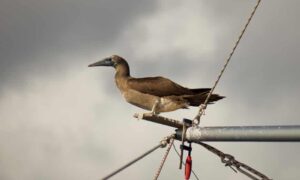
Increased tropical cyclones due to global heating could lead to dramatic declines in seabird populations, according to a new study.
Scientists found that after Cyclone Ilsa – a category-5 tropical cyclone – hit Bedout Island in Western Australia in April 2023, several seabird populations experienced a collapse of 80-90% due to the storm at the internationally important breeding site.
The study – published in the journal Communications Earth & Environment – found this level of loss could be unsustainable for seabird populations as the regularity and intensity of cyclones increase due to global heating, with the extreme winds, heavy rains and huge swells disrupting their breeding cycles.
Seabirds are crucial for maintaining tropical reefs, and the scientists warn that the loss of birds could put further pressure on ecosystems.
The study’s lead author, Dr Jennifer Lavers, a researcher at the Natural History Museum, said: “While Bedout may be one small island in a remote area of Australia, there’s so much we can learn from what happened here.
“More than 20,000 animals were lost in the blink of an eye,” she said. “Surveys of the island over three months make it clear recovery will be slow and likely interrupted by another cyclone event.”
Researchers used aerial and ground surveys to estimate the mortality of three species – the brown booby (Sula leucogaster), the lesser frigatebird (Fregata ariel), and an endemic subspecies of the masked booby (Sula dactylatra bedouti) – in the months after the storm.
At least 20,000 birds were lost on the 17-hectare (42-acre) Bedout Island, mostly breeding adults. The Bedout masked booby is found nowhere else. Lavers said the example of Bedout had broader implications for seabirds around the world.
